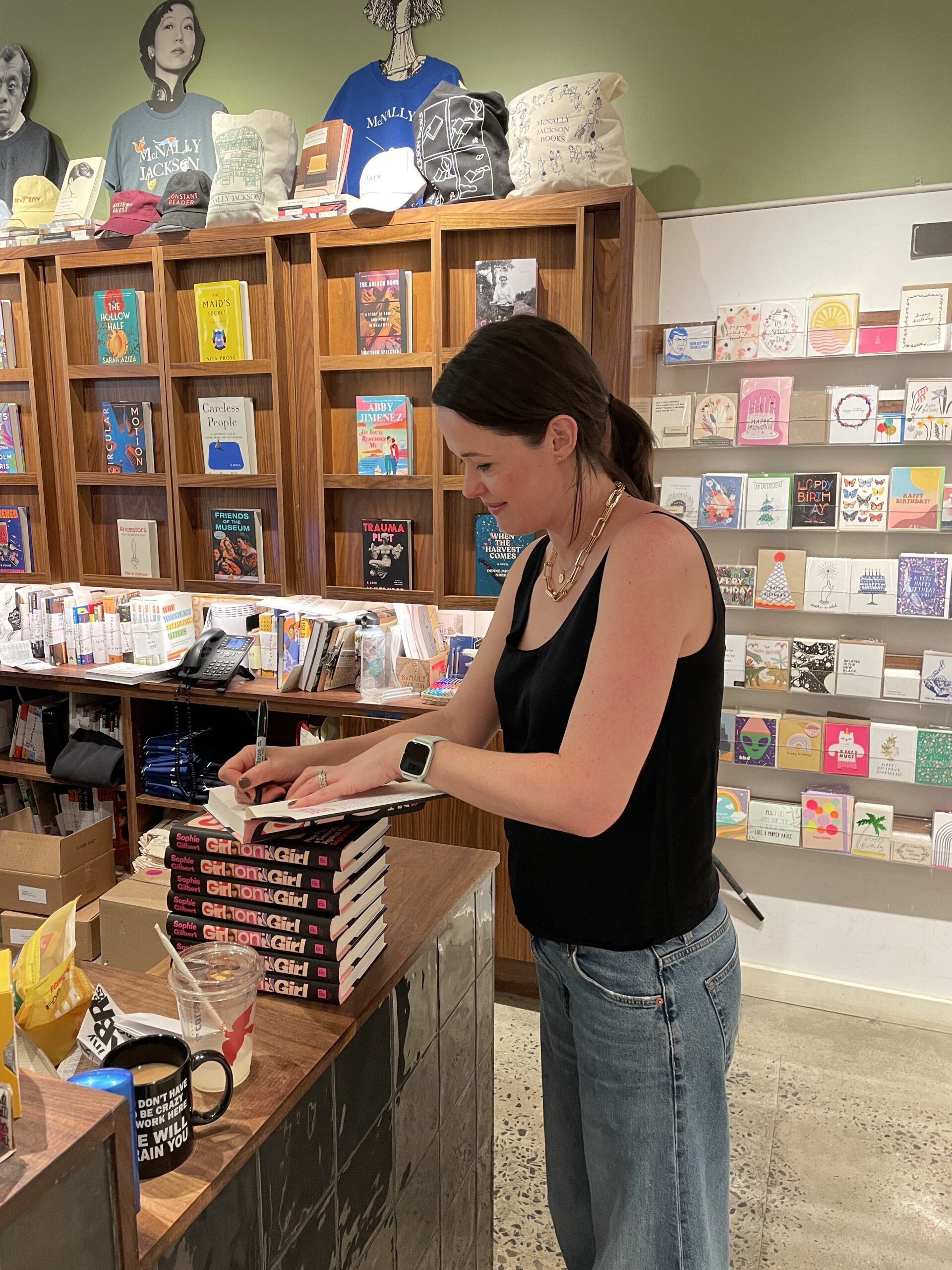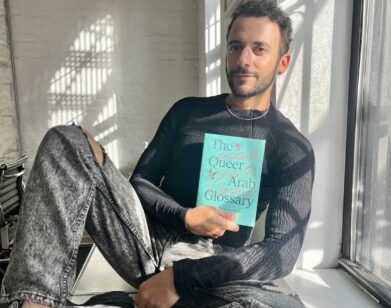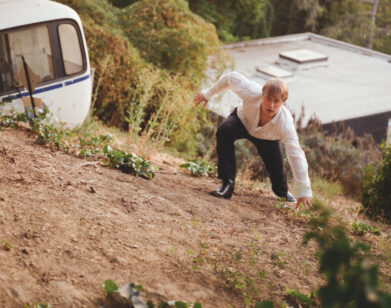IN CONVERSATION
Sophie Gilbert and Amanda Hess on MLMs, Motherhood, and Menstrual Tracking Apps
———
AMANDA HESS: How’s it going? Is it your birthday?
SOPHIE GILBERT: It is my birthday.
HESS: Oh my god, happy birthday. Can I ask—you don’t have to reveal your age to me, but since it’s your birthday, I was curious what age you were at when the stuff in the book was happening.
GILBERT: I’m 42 today, which I’m actually fine with. But my friend just sent me a picture of myself at 16 posing semi-erotically with an ice cream pop. A lot to unpack. It’s the year …Baby One More Time came out, American Beauty. 1999 was a crazy year.
HESS: For teenage girls, specifically. I turn 40 this year, and as I was reading your book, I was remembering that the video for “…Baby One More Time” came out when I was 13. It was the fall of my seventh grade year, and this sounds dramatic, but to me it’s the song that signals the end of my childhood. I grew up in Spokane, Washington, and then I moved to Phoenix in seventh grade, so I was coming in as an elementary school student, but they were already these weird semi grown-ups.
GILBERT: It was like a rift in time for Young Amanda, forced to grow up.
HESS: Yeah.
GILBERT: Someone else just said the same thing to me about that Britney song. Before that, they had been into Riot Grrrl music and punk music, and then Britney came out and suddenly everything changed. I feel like our lives have been weirdly in sync. I was at Washingtonian and you were at City Papery, and I think we found out we were pregnant the same month, November 2019, and had pandemic babies.
HESS: And our books are coming out at the same time.
GILBERT: It’s so cool.
HESS: One of the great things about reading books is understanding that you’re not sort of a uniquely wretched person. Reading your book developed so much empathy in me for my former self and my current self. Your criticism is so incredibly incisive and you have this 360-degree view of the culture that is embedded in our psyches. How did you navigate diagnosing the issues with these works while also acknowledging their appeal to women and not trashing the women who are involved?
GILBERT: That’s the balancing act in your book, too, where you can be skeptical of something and point out how damaging it is, but you’re also aware of how enticing it can be. Obviously something like Flo is not the same as a Britney Spears record, but we were indoctrinated from an age so young that you can’t really formulate any kind of defense against it. It’s taken me a long time to unlearn it, but it’s been fun.
HESS: It’s interesting that you compare Flo to Britney Spears. Flo is the menstrual tracking app that I used, which then converted into a fertility tracking app and then a pregnancy tracking app. Similarly, they’re styled in this bubblegum pink, hyper-feminine aesthetic that, especially as a young person, I’ve tried to distance myself from, but at the same time has been so influential over me. Without realizing it, I had been using the internet to understand what the cultural expectations were of me as a woman. For a long time, the idea of adhering to any cultural standard was bullshit to me, but when I became pregnant, I was so unmoored, not having any idea what a pregnant person was supposed to do or eat or how they’re supposed to move. I became very vulnerable to that again, and it really reminded me of this puberty experience.
GILBERT: I love that bit in your book about pregnancy wear, like we’re trying on a new identity to ease matrescence, the identity shift into motherhood. I wore so many leggings, just a lot of schlubby comfort wear. I was in Weill Cornell [Medical Center] wearing a mask and not having my husband there. It was so sensory, being transported back there. How did that come together in your mind?
HESS: I had been thinking about the idea of writing a non-fiction book where the internet sort of acted like a character, but I didn’t know exactly what to focus on. Then, by the time that I got pregnant, I started taking screenshots of things, without even thinking that it might be a book. Pregnancy just puts you on the front lines of all of these gendered messages. Then, when my pregnancy became complicated around seven months, I became even more obsessive about my technology use, trying to figure out how to assimilate all of that information. I remember feeling this horrific sense of superstition. I’m not a superstitious person, but I felt that by writing down funny notes about all of the absurd things that I was confronted with in pregnancy, I had brought this complication upon myself because I had been acting glib about it. Then I thought this was something I should be writing about.
GILBERT: It sounds so stupid, but there’s something so similar about birthing a book and birthing a child. There’s so much fear, doubt, impatience, hope, paranoia, profound anxiety. I’ve found the waiting part of this experience very similar to waiting for my babies to come.
HESS: When did you start to think that yours was a book?
GILBERT: It was right after the twins were born, in that moment of astonishing isolation, because all my family were in England. Very few people could come to New York, and when we had the babies the doctor told us, “Don’t let anyone see them until they’ve had their two-month shots.” I took that advice very literally, and around two weeks in, my son got silent reflux. The only way you could not have him screaming in awful pain was to hold him up for 45 minutes after every feed, but they feed every three hours, so we were sleeping two hours a night and I got very, very loopy. I couldn’t read, couldn’t watch movies, it was just survival mode and looking at my phone, and you sort of have a breakdown of self. When I went back to work, I had to build myself back together, identity wise. Writing was so hard. I couldn’t write silly stories anymore, so I started circling all these stories about culture and identity and how it forms us.
HESS: COVID was a very isolating time, and one of the things I struggled with writing this book was untangling how much of it is relevant to someone who has a baby in 2025.
GILBERT: COVID exacerbated the fear and the anxiety, but so much of that comes with having a newborn anyway. I remember living in Queens and hearing endless sirens. Sirens were the soundtrack to my pregnancy, and then the fireworks at night. I don’t know if you had fireworks where you are.
HESS: Oh yeah, constantly.
GILBERT: I wanted to ask you about the Bowen Yang quote about moms being “the terminus for anything cultural,” and choosing not to see that thought as a slight, but as liberation.
HESS: I love Las Culturistas, but I also feel like I’m getting a portal to a very different life with these two men who don’t have kids. They were talking about how Mean Girls is finally coming back to the kids, Bowen Yang said that. At first I was like, “Excuse me, I’m a mom!” But then there was something really appealing about the idea that I’m not expected to keep up with certain things anymore because I’m so dismissed in terms of my physicality, the clothes I wear, what I consume. I don’t have to create this pretense that I’m in any way on the front lines. And I’ve got to say, as someone who writes for the New York Times, our audience isn’t either. I’m writing for the most general audience you can imagine, so it’s really not my job to write about obscure stuff. I write in the book about how my son has a rare syndrome that caused him to have an enlarged tongue. That is so small in the scheme of human difference, but even that was enough to take me—this white, married, heterosexual, employed woman, who is very squarely within this post-feminist, neoliberal pregnant subject that we both are engaging with—outside of that.
GILBERT: I also think there’s something really interesting in going through total self-abnegation and not having time for your own needs at all.
HESS: Yeah. It would’ve been great if you wrote your first book before you had kids, but I don’t think it’s a coincidence that this is how it happened. We both probably pitched our books in 2022, when we both had two kids, and I never had less time, but I also had this unbearable need to reassert myself in the world in some way and just say something for myself, because I wasn’t doing that as much in my daily life.
GILBERT: Yeah. I live in London now and I don’t go into the office ever, so I feel like I have these completely bifurcated identities. The way I manifest in the world as a writer is so different from the way that I manifest as the parent of my children.
HESS: Do your kids know that you’re a writer?
GILBERT: Yes, and they unfortunately have learned to read, so when the copies of my book just arrived, they were like, “Girl on Girl!” They were running around the house and I was like, “Oh my god, I’m going to get a visit from child services.”
HESS: [Laughs] You were talking about how you were encouraged repeatedly to put more of yourself in your book, but you decided that it was important not to. Can you say more about that?
GILBERT: I don’t know if it was a conscious decision so much as a failure. When I was pitching the book in meetings, everyone was like, “Can you be more of a presence in it?” And I was like, “Yes, of course,” to sell my book. But when I tried to do it during the writing process, it just didn’t feel right. I have written personal essays in the past, and I came of age in the blogging era. My introduction to writing was doing a silly blog in 2005 about what I was doing that day. There were moments in the book where I’m like, “Oh, I’m getting emails from Jian Ghomeshi and I’m seeing Amy Winehouse in a bar and running into Paris Hilton on Fifth Avenue,” and I was like, “I hope it doesn’t feel too Forrest Gump.” But it felt natural and important. It’s really not a memoir. It’s much more a work of historical criticism.
HESS: Your writing is so assured, and the way that you integrate research into your narrative is so incredible. Then, when you as a character start to peek through, it’s a wonderful reminder that you did not always have this command.
GILBERT: Thank you. I felt that way about your Britney piece, because I remember so well how I felt when Britney shaved her head. I was working in a restaurant at the time, and my manager was in the office, and he kept calling me in to be like, “Britney’s shaving her head, Britney’s on a gurney.” It didn’t seem obscene to me that we were doing that, but it does now. So much of the reason why I wanted to write the book was to find out why we didn’t have the sense to see what we’re participating in.
HESS: Yeah. When her music first came out in middle school, I could sense that her body was marketed toward boys and her music was marketed toward girls. The boys in my class said as much. “Her music is dumb, but she’s hot.” Even at the time, there was a part of me that was aware of the message that I, as I became a woman, was going to be split open by this culture, and that the various parts of myself could be sold to different people.
GILBERT: I guess one of the central questions of my book is, why were we so swayed by the messaging that sex was power? I think because it looked so thrilling. Britney had so much influence, and when you’re a young girl, any kind of power seems thrilling. And if you can have that power by presenting yourself as an object, it’s easier to understand why it’s an appealing message.
HESS: I think we both dip into trad wives for a couple of pages. At first, I was not particularly interested in them as a phenomenon because I tend not to be drawn to things that I don’t feel implicated in, but I’ve come to see them as such interesting figures. They’re not throwbacks at all, but hyper-modern figures who are modeling the simultaneous work of production while consuming, and creating a new generation of producers and consumers. Even their videos collapse time, and that’s just the pure infusion of this post-feminist ideal that you talk about.
GILBERT: We both have MLMs in our book, too. They’re so interesting to me as a symbol of America’s failure to imagine that women can be mothers and have jobs at the same time, because they’re part of this magical thinking that you can make money and be seen and be powerful, but also squeeze it into your evenings and your weekends and work out of your garage.
HESS: Right, and the first step to market yourself is for you to become a consumer and buy the thing.
GILBERT: Yeah.
HESS: I was investigating more as a researcher and a journalist as opposed to a consumer, but it was still important for me to be very specific about my experiences. People like characters in books to be interesting and complicated and wrong, even. People like evil characters. People don’t like any of that stuff in a real woman, and especially not in a mother, so as a real person who had to sell this book but also make myself into a character, I felt incredibly anxious. I made my thoughts in the book as complex as possible, and that means that I recorded a lot of experiences that I now deeply disagree with. I have fears of my book being chopped up and having things put online out of context, and I was thinking about that as I read the end of your book, where you talk about the rise of autofiction and the role of women in it. When a woman who’s an artist makes herself the subject, our culture is so attuned to dissecting her as the subject or the object as opposed to as the artist. Like Lena Dunham and Sheila Heti and others who are brilliant, but in a way it just doesn’t matter how careful or good it is because it’s subsumed by a fascination with them as the subject or the object.
GILBERT: Yeah. Writing now in my forties versus writing in my twenties, I just care so much less about what certain people think. When an excerpt from my book went up last week, people were saying stuff—and it’s not that it washed over me, but it just doesn’t matter because I didn’t write the book for them. It doesn’t represent their experience. A lot of what they were saying was obviously false, but it doesn’t matter because it’s just not the point. It’s such a bind to be in, because there’s so much pressure and you don’t have any capacity to fuck up. Thinking about your piece for Slate about not having kids, I remember doing a book review along the same lines that was like, “Why would women have children in this environment?” Really, really snotty. When I told my boss I was pregnant, I think he was like, “I thought you didn’t want kids.”
HESS: “Surprise. It’s twins.” I was interested to see that 36,000 people came to your excerpt by searching for the term “porn.”
GILBERT: I know. I called it Girl On Girl because I wanted people to google porn and find feminist criticism instead, and it’s happening.
HESS: You should put an excerpt in the Pornhub comments.
GILBERT: Oh, that’s a good idea, but I think my internet provider has family blocking on. I want to ask, did you feel catharsis through writing the book? Did it feel relieving to get so much out?
HESS: I think right after I filed my last draft with my editor, who is so lovely, he sent me something like, “I hope this process has been nourishing for you.” I was like, “Are you fucking kidding me? Obviously not.” I was at my peak of anxiety at that moment, but now I have so much clarity on things that used to really perplex me. What about you?
GILBERT: I think there was something adjacent to shame that I’d always felt about certain things that happened in my teens and twenties, and writing the book was really freeing. I understood how toxic the media environment was, and how there was really no counter-narrative. In some ways, that makes me feel a lot more at peace with little Sophie.
HESS: I feel so lucky to have writing and reading. To be able to have a critical distance from the life that we’re living is the most calming and reassuring thing that I can do for myself.
GILBERT: As someone who thinks so incisively about the internet, but also has a book coming out, how do you feel about Goodreads?
HESS: I haven’t looked at that yet. I may never. My publishers have sent me some early reviews, but I’m sure that if a negative review comes out, they’re just not going to send it to me and I’ll never see it. I don’t want to engage, though I’m sure there’ll be a low moment in my life where I’m like, “Hey, I wonder what all of these Goodreads users think of me,” and then perhaps I can wallow in that for a moment. But I’m just too busy.
GILBERT: That’s very mentally healthy of you, ’cause I’m such a sicko. I used to put my articles into X, when it was Twitter, to see what people were saying about them, which is the most self-damaging thing you can do on the internet because it was always bad. Some of them are just so funny that you can’t really take it personally. There was one that was like, “This is a really good book, but it needs way more on women in STEM.”
HESS: That sounds like a whole different book.
GILBERT: It’s not perfect, but it’s the book that I wanted to write, and I wanted to write it because I would’ve wanted to read it. So I have to hope that that’s enough for some people.







